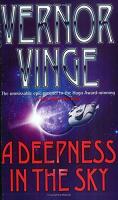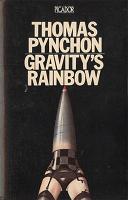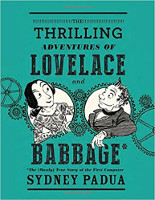 A Deepness in the Sky is the (only loosely connected) prequel to ‘A Fire Upon the Deep’ by Vernor Vinge; it's a complex, emotionally intense, and well executed Large-Scale Space Opera, which deservedly received the Hugo and John W Campbell Memorial Awards.
A Deepness in the Sky is the (only loosely connected) prequel to ‘A Fire Upon the Deep’ by Vernor Vinge; it's a complex, emotionally intense, and well executed Large-Scale Space Opera, which deservedly received the Hugo and John W Campbell Memorial Awards.
I presume that most of our readers have read this book long ago; so I shall keep this brief… but if you haven’t read this book yet then I would strongly recommend you give it a try!
The story follows a Queng Ho expedition to the On-Off Star. Queng Ho are a family based group of traders between all the worlds within the human sphere (but not an Empire, to the chagrin of their founder/spiritual father, Pham Nuwen), and the On-Off star is exactly that – an oscillating star that is lit 50 years at a time, with 200-year gaps of inactivity in-between. Trigger for the expedition is the fact that radio emissions have been detected during from its only planet during the last On period, and the Queng Ho figure that, by the time the sun re-ignites, the inhabitants (whoever they are) will have developed into a technological society the Queng Ho can trade with – for mutual gain. Too bad that they are not alone in their endeavour. Another group of humans, newly arisen from a fallen civilization (no rarity, it’s part of the lifecycle of planet bound civilaizations) calling themselves the ‘Emergents’ also has sent a fleet.
The inevitable happens – it comes to a conflict, and after slugging it out, nuke for nuke, spaceship for spaceship, both groups are barely alive, and won’t survive without cooperation, under the lead and command of the Emergents, who came off a fraction less worse.
But the Emergents have a secret – they have ‘Focus’, which, it transpires, are people who are infected with a micro-organism affecting the brain (‘mindrot’), which, if handled correctly, provides the victim with a raised state of focus on a narrow topic (Asperger’s like), at the price of absolute loyalty to their ‘handler’, no emotional (or any other) life, and thus yielding completel under control to their masters. Human computers, in slavery, to give another view point.
Meanwhile, on Arachna (so called because of it’s inhabitants, which are 10-legged arachnoids, and which are, obviously, called ‘spiders’ by the humans), technological progress is fast, much faster than it was on Earth, the human’s near-mythological homeworld. The reason for this is Sherkaner Underhill, a genius with more ideas a day than most people manage during their lifetime, and his friends from the Accord Intelligence Services, who work on turning the feasible ones into technology and military advantage for the Accord.
The game is simple: the humans need the spider civilization, they won’t be able to re-build and re-fuel their fleet (or what’s left of it) to go home. The spiders, on the other hand (even if they don’t know it yet), need the humans as external intervention to avoid going the way of all planet based (aka sessile) civilizations, and either exterminate themselves or fall back into Barbary – a theme that’s played out in variants across the background story, again and again. No starflight without planetary technological civilizations to visit and re-charge; but no sessile civilizations without external intervention to keep them from sliding at one point or another. A rather interesting symbiotic concept.
The concepts in the book come inventive, fast, and thick. Starting with the Queng Ho (their history is told as a reminiscence as part of the book), the life cycle of planetary civilizations, the Queng Ho dependence and influence on those are a very well worked out backdrop to the actual story.
Technologically we have coldsleep between waking periods, no FTL (which means you sleep most of the way except for rotating watches), and the Emergents have Focus, which is a new ‘technology’ to the Queng Ho, who amass other people’s best endeavour.
A lot of focus is on the sociological implications – with the Queng Ho, the Emergents, the cooperation of these nearly incompatible societies, and, of course, the spider’s world with its various factions and nations. A big strand is about individuals shaping the future of their race or society – may this be Sharekaner Underhill, the spider genius; Pham Nuwen, the founder of the Queng Ho culture; or Thomas Nau and Ritser Brueghel, the sadistic ‘Podmasters’ of the Emergents.
The story contains a lot of parallels between various strands and people – a very simple one is coldsleep, where the humans spend hundreds of years frozen, just to be awake for a few years when they are needed; the spiders do the same with their On-Off sun, where they hibernate in their ‘Deeps’ during the off-periods, frozen (now, look at the title of the book again!).
The other fascinating bit is that the spiders sometimes appear more human, more understandable to us than the Queng Ho or the Emergents – we have more in common with them than with our space-faring future brothers.
Vinge himself doesn’t really need introducing, no? 12 books to his name, three times winner of the Prometheus Award, double winner of the Hugo Award (including this book), winner of the John W Campbell Memorial Award (for this book, again), and nominated, repeatedly, for about everything else, too. Good enough? ;-)
This book is a (loose) prequel to the earlier written ‘A Fire Upon the Deep’, Vinge’s other large-scale space Opera. It is, as you would expect from a multi-award winning book, very well written, engaging, and emotionally intense in parts, with a complex and thought-provoking plot with plenty of non-obvious developments and several real surprises. Vinge is also very good at sending one down the wrong road mentally whilst reading, and then jolt you into realizing that you are guilty of lazy thinking, again; a lot like Frederic Brown in his short stories does.
Recommendation? A ‘must read’ if you haven’t done so yet. I’m in the market for the sequel, meanwhile. Watch this space…
More Vernor Vinge
Title: A Deepness in the Sky
Author: Vernor Vinge
Reviewer: Markus
Reviewer URL: http://skating.thierstein.net
Publisher: Tor
Publisher URL: http://www.tor.com
Publication Date: 2000
Review Date: 26 January 2007
ISBN: 0812536355
Price: UKP6.99 new, much cheaper on Amazon!
Pages: 774
Format: Paperback
Topic: SF
Topic: Space Opera
Topic: Sociology













